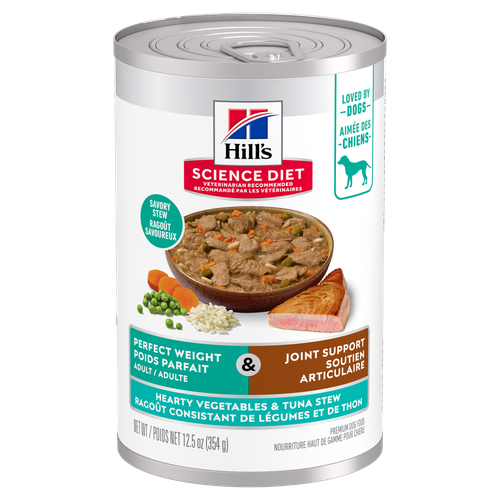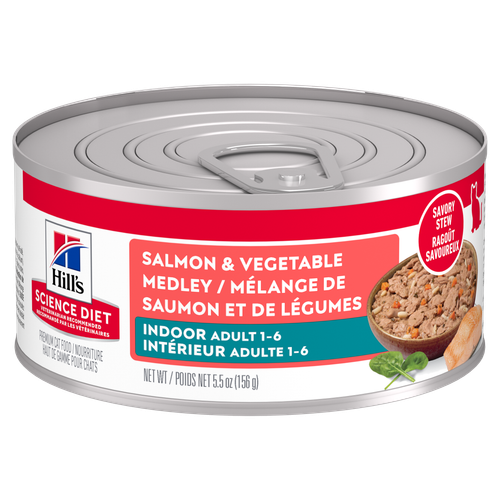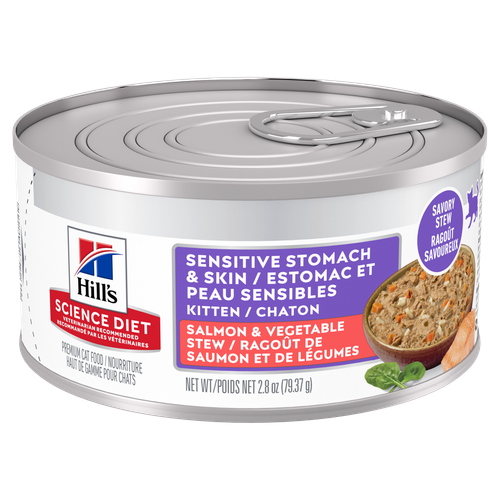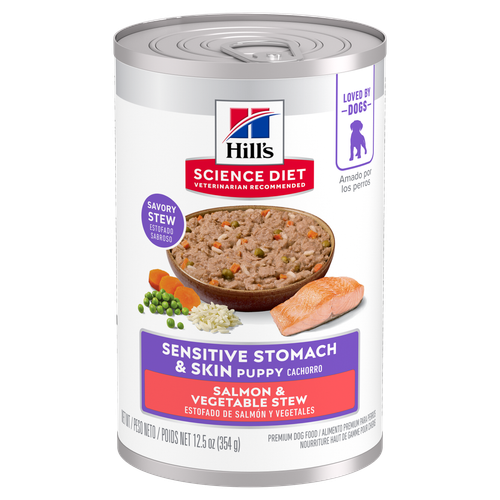
-
Find the right food for your petTake this quiz to see which food may be the best for your furry friend.Find the right food for your petTake this quiz to see which food may be the best for your furry friend.Featured products
 Sensitive Stomach & Skin, assortiment de conserves
Sensitive Stomach & Skin, assortiment de conservesHill's Science Diet Sensitive Stomach & Skin Variety Pack
Shop Now Healthy Cuisine, Adulte, assortiment de conserves
Healthy Cuisine, Adulte, assortiment de conservesHill's Science Diet Healthy Cuisine Variety Pack
Shop Now Adult Perfect Weight & Joint Support Hearty Vegetables and Tuna Stew Dog FoodShop NowFeatured products
Adult Perfect Weight & Joint Support Hearty Vegetables and Tuna Stew Dog FoodShop NowFeatured products Adult Indoor Salmon & Vegetable Medley Cat Food
Adult Indoor Salmon & Vegetable Medley Cat FoodPrecisely balanced nutrition for indoor cats with the delicious taste of savory salmon and vegetables
Shop Now Kitten Sensitive Stomach & Skin Salmon & Vegetable Stew
Kitten Sensitive Stomach & Skin Salmon & Vegetable StewSupports kitten growth, digestive health, nourishes skin and promotes a lustrous fur
Shop Now Adult Urinary Hairball Control Savory Chicken Entrée cat food
Adult Urinary Hairball Control Savory Chicken Entrée cat foodSupports the health of the whole urinary system with optimal levels of magnesium
Shop Now -
Dog
- Dog Tips & Articles
-
Health Category
- Weight
- Food & Environmental Sensitivities
- Urinary
- Digestive
- Joint
- Kidney
- Dental
- Cancer
-
Life Stage
- Puppy Nutrition
- Adult Nutrition
- Senior Nutrition
Cat- Cat Tips & Articles
-
Health Category
- Weight
- Skin & Food Sensitivities
- Urinary
- Digestive
- Kidney
- Dental
- Stress
- Cancer
-
Life Stage
- Kitten Nutrition
- Adult Nutrition
Featured articles Pet Food Storage Tips
Pet Food Storage TipsDiscover how and where to store your dry, as well as canned, dog and cat food. Learn how to find the "best before" dates on all Hill's pet food packaging.
Read More Compare Your Pet Food's Calories to Other Brands
Compare Your Pet Food's Calories to Other BrandsCompare Hill's Science Diet dog and cat food's calories against other pet food brands and AAFCO recommended maximum calorie count.
Read More The Incredible Science Behind Your Pet's Microbiome
The Incredible Science Behind Your Pet's MicrobiomeLearn what a pet's microbiome is, how it contributes to your pet's gut & overall health, and why nutrition is important in maintaining healthy microbiomes.
Read More -


When humans sit down for a meal, they usually take time to enjoy their food. Your dog, though, takes a completely different approach — they usually finish their kibble in seconds. Read on to learn any potential issues that can happen with your dog eating too fast, plus what you can do to slow them down.
Why Does My Dog Eat So Fast?

While it's possible that your pooch just really likes their food, here are a few more likely reasons why your dog eats fast:
- Competition: If you have more than one dog, your fast eater may feel they have to eat quickly to keep other dogs from snatching food from them, says PetSafe. Or, they may have had to compete for food as a puppy with their litter mates. This sense of competition could also be instinctual. So, even if your pup is an only dog, they may view other members of the household, including cats and people, as competition.
- Irregular meal timing: If you adopted your dog from the shelter it's possible that their previous owners did not follow proper feeding etiquette or keep to a regular feeding schedule, so your dog eats as if they aren't sure when they'll get their next meal. This can also be true of dogs who were formerly strays and had to find food in the wild. After time, care and lots of love, your dog may start to slow down, realizing that their next meal isn't too far away.
- Poor nutrition: The quality of your dog's food might be to blame. Some foods aren't well-balanced. Check with your veterinarian to ensure your dog is getting the proper nutrients, and get a recommendation for a high-quality food.
- Underlying illness: It's possible that an underlying health condition is causing your dog to feel excessively hungry. Diabetes and Cushing's syndrome can impact your dog's metabolism and increase their appetite, says Puppytip. Worms or other parasites could also be the culprit.
The Dangers of Dogs Eating Too Fast

Not only can fast-eating signal an untreated illness — but it can also cause your dog to become sick. According to the American Kennel Club (AKC), if your dog eats too fast, they could experience digestive problems and vomiting. More seriously, consuming food without chewing is a choking hazard. Another risk is a condition called bloat, which occurs when a dog swallows a lot of air as a result of eating too quickly, says the AKC. Bloat is very uncomfortable for your dog. GDV requires immediate veterinary attention because your pup's stomach is twisted, which can lead to a rupture.
If the reason for your dog's fast eating isn't clear, it's a good idea to have them checked out by a vet — especially if it's a new behavior.


Tasty Tips
How to Slow Down Speed-Eating Dogs
If it turns out that your dog has an underlying illness, treating the condition will hopefully return their appetite to normal and slow down their eating. If low-quality food is the issue, then switching to one of better quality should solve the problem. Feeding competitive eaters separately from other pets in a place where they feel safe to eat more slowly might take care of that particular problem. But if none of those solutions slow your fast eater, here are a few tricks you can try:
- Increase feedings: Serving your pup smaller meals two or three times a day instead of giving them all of their food at once may help. Having smaller meals also decreases their risk for bloat, says Dogster.
- Use a slow feeder bowl: Slow feeder bowls have built-in obstacles specifically designed to cause dogs to eat more slowly. Commercially made bowls are available, but you can also make your own by placing a smaller bowl upside down inside your dog's regular dish and pouring their food around it.
- Make meal time fun: Serve your pooch's food inside a food-dispensing dog toy that only releases a few pieces of kibble at a time. You can make your own version by simply placing a muffin tin upside down and pouring their food in between the muffin molds, so they have to fish it out.
While the reason behind your dog's fast eating may not be serious, if left unchecked, your pup's eating habits could lead to a medical issue. Next time you see your dog inhale their food, remember that what seems like just quirky behavior could have a serious impact on their health.


Jean Marie Bauhaus is a pet parent, pet blogger, and novelist from Tulsa, Oklahoma, where she usually writes under the supervision of a lapful of fur babies.
Related products

Gentle on stomachs while nourishing skin & supporting development in growing puppies

Hill's Science Diet Sensitive Stomach & Skin Variety Pack

Hill's Science Diet Healthy Cuisine Variety Pack

Related articles

Proper nutrition for your pregnant or nursing dog is vital to her and her puppy's health. Learn what you should do provide her with the proper nutrients.

Learn how to stop your dog from begging at the dinner table, and understand how it can help contribute to his health.

Gather the following puppy supplies to prepare your family for all the fun (and commitment) that comes with being a dog parent.

Discover fun and engaging games and other ways to help your dog exercise, keeping him happy and healthy.

Put your dog on a diet without them knowing
Our low calorie formula helps you control your dog's weight. It's packed with high-quality protein for building lean muscles, and made with purposeful ingredients for a flavorful, nutritious meal. Clinically proven antioxidants, Vitamin C+E, help promote a healthy immune system.
Put your dog on a diet without them knowing
Our low calorie formula helps you control your dog's weight. It's packed with high-quality protein for building lean muscles, and made with purposeful ingredients for a flavorful, nutritious meal. Clinically proven antioxidants, Vitamin C+E, help promote a healthy immune system.

